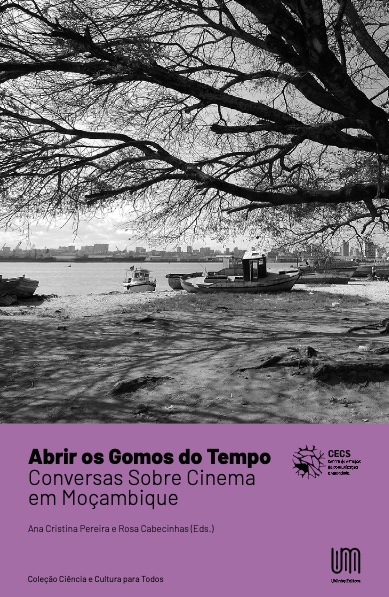The book “Abrir os Gomos do Tempo: Conversas Sobre Cinema em Moçambique“, edited by Ana Cristina Pereira (CES/UC) and Rosa Cabecinhas (CECS/UM), researchers of the project “Memories, Cultures and Identities: the past and present of intercultural relations in Mozambique and Portugal” (FCT/Aga Khan) has just been published by UMinho Editora. The book published in the context of the project brings together a set of interviews with personalities on the history of cinema in Mozambique and is available for open access
This set of conversations is essentially aimed at those who like to hear stories told. These conversations have a strong cinematographic slant, not only because the motto that runs through them is cinema in Mozambique, but mainly because the way in which the memories that inhabit this space are revealed is also often formulated through images that have movement. Abrir os Gomos do Tempo: Conversas Sobre Cinema em Moçambique is also for those people who, like us, are happy to hear again the phrase, “another world is possible!” and has, in our view, the beauty and strength of the words of those who believe in new possibilities of life. The book opens with a preface by Nataniel Ngomane and consists of a set of conversations with key personalities in the history of Mozambican cinema: Américo Soares, Faria de Almeida, Gabriel Mondlane, Jean-Luc Godard, João Ribeiro, José Cardoso, Licinio Azevedo, Lopes Barbosa, Luís Carlos Patraquim, Pedro Pimenta, Ruy Guerra and Sol de Carvalho. The interviews were conducted by Ana Cristina Pereira, Diana Manhiça, Lurdes Macedo, Maria do Carmo Piçarra, Rosa Cabecinhas, Sheila Khan and Sílvia Vieira. The book ends with a speech by José Luís Cabaço, made in 1980, when he was Mozambique’s Minister of Information, accompanied by an introduction made by Cabaço himself, which corresponds to his current reading of that speech as Minister. This book is dedicated to the memory of Joaquim Lopes Barbosa (1945-2021) and is simultaneously a heartfelt tribute to all filmmakers who had the courage to face State censorship. This modest gesture is intended to encourage all those who still face it, in its many and varied forms. Dictators die, regimes pass, but films remain.


